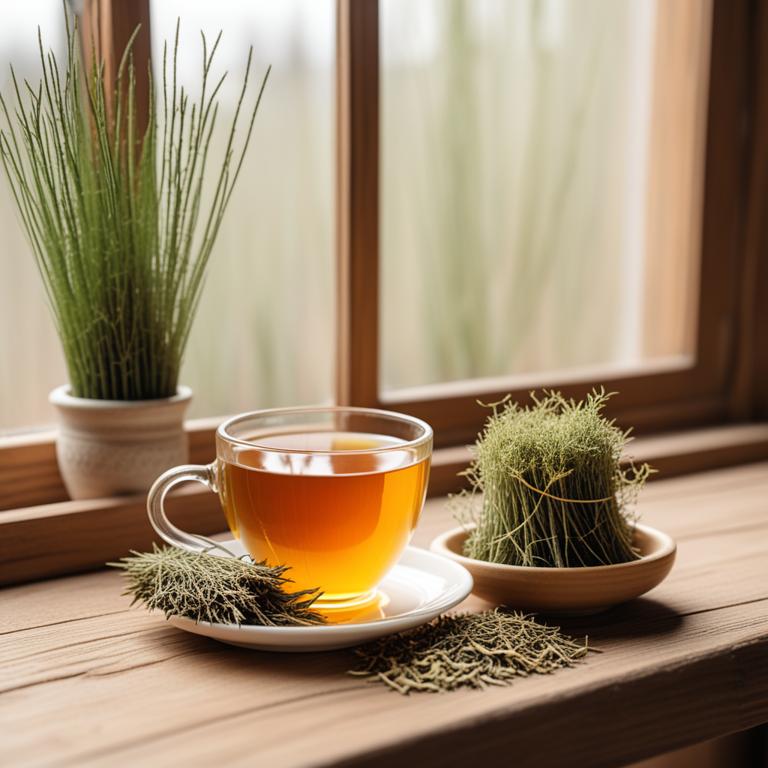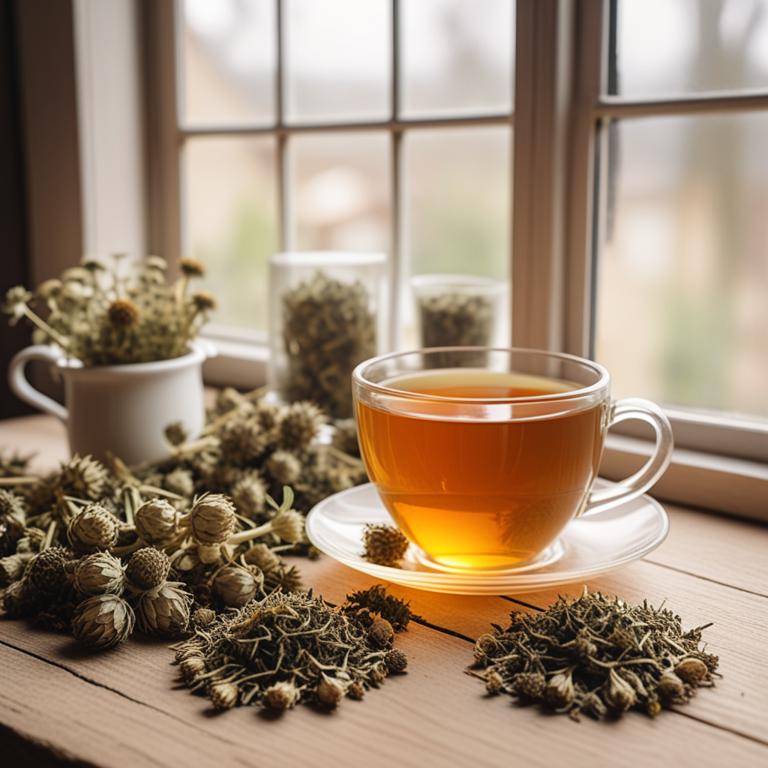11 Herbal Teas For Urinary Calculus

Herbal teas have been used for centuries to help alleviate the symptoms of urinary calculus, also known as kidney stones.
These stones can be painful and uncomfortable, but certain herbs have been found to help relieve the discomfort. For example, Equisetum arvense, also known as horsetail, has been used to help dissolve kidney stones by increasing urine production and flushing out the stones.
Berberis vulgaris, or barberry, has anti-inflammatory properties that can help reduce swelling and pain in the urinary tract. Urtica dioica, or stinging nettle, has been found to help reduce the risk of kidney stones forming in the first place by improving kidney function and preventing the formation of stone-forming minerals. Drinking these herbal teas can bring several benefits to your life, including improved kidney function, reduced pain and discomfort, and a lower risk of developing kidney stones.
By incorporating these teas into your daily routine, you can take a natural and effective approach to managing urinary calculus and promoting overall kidney health.
- 1. Equisetum arvense
- 2. Berberis vulgaris
- 3. Urtica dioica
- 4. Taraxacum officinale
- 5. Arctium lappa
- 6. Glycyrrhiza glabra
- 7. Curcuma longa
- 8. Juniperus communis
- 9. Silybum marianum
- 10. Achillea millefolium
- 11. Foeniculum vulgare
1. Equisetum arvense

Equisetum arvense teas contains silicic acid, flavonoids, and saponins, which are biologically active compounds that help reduce inflammation and irritation in the urinary tract.
Silicic acid has astringent properties that help to reduce swelling and prevent further stone formation. The flavonoids in Equisetum arvense teas have antioxidant properties that help to protect the kidneys and urinary tract from damage caused by free radicals. Saponins help to reduce the risk of urinary tract infections by inhibiting the growth of bacteria.
By reducing inflammation and preventing infection, Equisetum arvense teas may help to alleviate symptoms associated with urinary calculus.
- Gather 1 cup of fresh or dried Equisetum arvense (horsetail) leaves and stems.
- Crush 1 tablespoon of the leaves and stems to release their flavor and oils.
- Combine the crushed Equisetum arvense with 1 cup of boiling water in a pot.
- Let it steep for 5-7 minutes, then strain the liquid into a cup.
- Drink 1/2 cup of the tea, 3-4 times a day, as needed for urinary calculus relief.
2. Berberis vulgaris

Berberis vulgaris teas contains berberine, a key bioactive constituent, that helps break down kidney stones and urinary calculi.
Berberine has anti-inflammatory and antioxidant properties, which reduce inflammation and oxidative stress in the urinary tract. The tea also contains alkaloids like berbamine and oxyberberine, which increase urine production and help flush out toxins and minerals that can cause stone formation. The diuretic properties of Berberis vulgaris teas help increase fluid intake and reduce the concentration of minerals in the urine, making it easier to pass stones.
Regular consumption of this tea may help prevent the formation of new kidney stones by reducing the risk of mineral buildup in the urinary tract.
- Gather 2 tablespoons of dried Berberis vulgaris root and 1 cup of water.
- Boil the water in a pot and add the dried root.
- Let it simmer for 5-7 minutes, then turn off the heat.
- Strain the mixture into a cup and discard the root.
- Drink the tea 2-3 times a day to help dissolve urinary calculus.
3. Urtica dioica

Urtica dioica teas contains compounds like histamine, serotonin, and various flavonoids.
These bioactive constituents help relax the smooth muscles in the urinary tract, reducing spasms and promoting regular urination. The tea's anti-inflammatory properties, attributed to compounds like quercetin and kaempferol, can help reduce swelling and irritation associated with kidney stones. Urtica dioica also has diuretic properties, increasing urine production and helping the body eliminate waste and toxins that can contribute to stone formation.
By reducing muscle spasms, inflammation, and promoting regular urine flow, Urtica dioica teas may help alleviate symptoms of urinary calculus.
- Gather 1 cup of fresh or dried Urtica dioica leaves. If using fresh, wash them with clean water.
- Steep 1-2 teaspoons of Urtica dioica leaves in 1 cup of boiling water for 5-7 minutes.
- Strain the mixture into a cup and discard the leaves. Add honey or lemon to taste, if needed.
- Drink 1/2 to 1 cup of the tea 2-3 times a day. You can also store it in the fridge for up to 24 hours.
- Consult a doctor or healthcare professional before using Urtica dioica tea for urinary calculus, especially if you have underlying health conditions or allergies.
4. Taraxacum officinale

Taraxacum officinale teas contains flavonoids, including quercetin and kaempferol, and sesquiterpenes, such as arabinoglycosides and taraxasterol.
These compounds have anti-inflammatory properties, which can help reduce swelling and pain associated with urinary calculus. The flavonoids in Taraxacum officinale teas also have antioxidant and diuretic properties, which can help flush out toxins and excess minerals that contribute to kidney stone formation. The arabinoglycosides in Taraxacum officinale teas have been shown to inhibit the growth of certain bacteria that can cause urinary tract infections, a common complication of urinary calculus.
By reducing inflammation, flushing out toxins, and inhibiting bacterial growth, Taraxacum officinale teas may help alleviate symptoms and support the treatment of urinary calculus.
- Gather 1 cup of Taraxacum officinale flowers, 2 cups of water, and a strainer.
- Combine the flowers and water in a saucepan, and bring to a boil.
- Reduce heat to a simmer for 5-7 minutes.
- Strain the mixture through a cheesecloth or a fine-mesh strainer into a cup.
- Drink the tea 3-4 times a day for 1-2 weeks to help with urinary calculus.
5. Arctium lappa

Arctium lappa teas contains inulin, a soluble fiber that helps dissolve kidney stones by increasing urine volume and flushing out minerals.
It also contains sesquiterpene lactones like arctigenin and lappaol, which have anti-inflammatory properties that reduce swelling and pain in the urinary tract. Arctium lappa teas also contains saponins, which help break down and dissolve kidney stones by inhibiting the growth of bacteria that contribute to stone formation. Additionally, the tea's high inulin content helps prevent the re-formation of stones by reducing the concentration of minerals in the urine.
The combination of these compounds in Arctium lappa teas makes it a potential remedy for urinary calculus.
- Gather 1 cup of fresh Arctium lappa roots and 1 cup of water.
- Clean and chop the Arctium lappa roots into small pieces.
- Steep the chopped roots in a pot with 1 cup of water for 5-7 minutes.
- Strain the liquid and discard the solids. Add honey or lemon to taste.
- Drink the tea 2-3 times a day for up to 2 weeks to help dissolve urinary calculi.
6. Glycyrrhiza glabra

Glycyrrhiza glabra teas contains glycyrrhizin, a potent compound that has anti-inflammatory and antioxidant properties.
Glycyrrhizin helps to reduce inflammation in the urinary tract, which can prevent the formation of kidney stones. Glycyrrhiza glabra teas also contains flavonoids and phenolic acids, which have been shown to inhibit the growth of bacteria that can contribute to urinary calculus. The anti-inflammatory and antimicrobial properties of glycyrrhizin and other compounds in Glycyrrhiza glabra teas help to reduce the risk of urinary tract infections and stone formation.
By reducing inflammation and inhibiting bacterial growth, Glycyrrhiza glabra teas can help to prevent the development of urinary calculus.
- Gather 2 tablespoons of dried Glycyrrhiza glabra root and 1 cup of boiling water.
- Steep the dried root in the boiling water for 5-7 minutes.
- Strain the liquid through a fine-mesh sieve or cheesecloth into a cup.
- Add 1 tablespoon of honey to the liquid, if desired, for taste.
- Drink the tea 2-3 times a day for urinary calculus relief.
7. Curcuma longa

Curcuma longa teas contains active constituents like curcumin, demethoxycurcumin, and bisdemethoxycurcumin.
These compounds have anti-inflammatory and antioxidant properties that help reduce inflammation and oxidative stress in the urinary system. Curcumin, in particular, has been shown to inhibit the formation of kidney stones by reducing the activity of certain enzymes that contribute to stone formation. Additionally, curcumin has been found to increase the solubility of certain minerals, making it easier for the body to dissolve and pass stones.
By reducing inflammation and promoting solubility, curcuma longa teas may help alleviate the symptoms of urinary calculus.
- Boil 1 cup of water in a pot.
- Add 1 tablespoon of dried Curcuma longa root to the boiling water.
- Reduce heat and let it simmer for 5-7 minutes.
- Strain the tea into a cup and discard the root.
- Drink the tea while it's still warm, 2-3 times a day.
8. Juniperus communis

Juniperus communis teas contains essential oils like α-pinene, β-pinene, and sabinene, which have anti-inflammatory and diuretic properties.
These compounds help to increase urine production and reduce inflammation in the urinary tract, making it easier to pass small stones. The flavonoids and phenolic acids present in the tea, such as kaempferol and ferulic acid, also have antioxidant and anti-inflammatory effects, which can help to prevent the formation of new stones. The diuretic properties of the tea can also help to flush out the urinary system and reduce the risk of stone formation.
The combination of these bioactive constituents makes Juniperus communis teas a potentially useful remedy for urinary calculus.
- Gather 1 cup of Juniperus communis berries and 1 cup of water.
- Crush the Juniperus communis berries to release their flavor and oils.
- Combine the crushed berries and water in a saucepan, and bring to a boil.
- Reduce heat and let it simmer for 10-15 minutes, then strain the mixture.
- Drink 1 cup of the tea, 3 times a day, for urinary calculus relief.
9. Silybum marianum

Silybum marianum teas contains silymarin, a mixture of bioactive compounds, including silibinin, silidianin, and silicristin.
These compounds have antioxidant and anti-inflammatory properties, which can help reduce inflammation in the urinary tract and prevent the formation of kidney stones. Silymarin also has a diuretic effect, increasing urine production and helping to flush out minerals and salts that can contribute to stone formation. Furthermore, silymarin has been shown to inhibit the growth of certain bacteria that can cause urinary tract infections and contribute to the development of kidney stones.
Regular consumption of Silybum marianum teas may help prevent the recurrence of urinary calculus by promoting a healthy urinary tract and reducing the risk of stone formation.
- Gather 1 cup of fresh or dried Silybum marianum flowers.
- Measure 1 tablespoon of the flowers and place them in a heat-resistant cup.
- Boil 1 cup of water in a kettle or pot.
- Pour the boiling water over the flowers and let it steep for 5-7 minutes.
- Strain the tea and drink it warm, 2-3 times a day, as needed for urinary calculus relief.
10. Achillea millefolium

Achillea millefolium teas contains sesquiterpene lactones, flavonoids, and polyacetylenes as its active constituents.
These compounds have anti-inflammatory and antioxidant properties that help reduce inflammation and oxidative stress in the urinary tract, making it a potential remedy for urinary calculus. The sesquiterpene lactones, particularly achillin and alantolactone, have been shown to inhibit the growth of certain bacteria that can contribute to kidney stone formation. The flavonoids, including luteolin and apigenin, have antioxidant properties that help protect the kidneys from oxidative damage and promote the excretion of stone-forming substances.
By reducing inflammation and promoting the removal of stone-forming substances, Achillea millefolium teas may help prevent the formation of new kidney stones.
- Gather 2 tablespoons of dried Achillea millefolium leaves.
- Boil 1 cup of water in a pot.
- Add the dried leaves to the boiling water and let it steep for 5-7 minutes.
- Strain the liquid into another cup using a tea strainer or cheesecloth.
- Drink the tea 2-3 times a day to help manage urinary calculus symptoms.
11. Foeniculum vulgare

Foeniculum vulgare teas contains a compound called estragole, which has been shown to have anti-inflammatory properties that help reduce swelling in the urinary tract.
The tea also contains volatile oils like limonene and beta-pinene, which have been found to have analgesic and antispasmodic properties that help alleviate pain and relax the muscles in the urinary tract. The antiseptic properties of estragole and other compounds in Foeniculum vulgare teas also help prevent infections that can contribute to urinary calculus. Additionally, the diuretic properties of the tea help increase urine production, which can help flush out small stones and prevent their formation.
Regular consumption of Foeniculum vulgare teas may also help reduce the size and number of kidney stones by breaking down the minerals that contribute to their formation.
- Gather 1 cup of fresh Foeniculum vulgare leaves or 2 tablespoons of dried leaves.
- Boil 1 cup of water in a pot.
- Add the Foeniculum vulgare leaves to the boiling water.
- Reduce heat and let it simmer for 5-10 minutes.
- Strain the tea and drink 1-2 cups per day to help with urinary calculus.